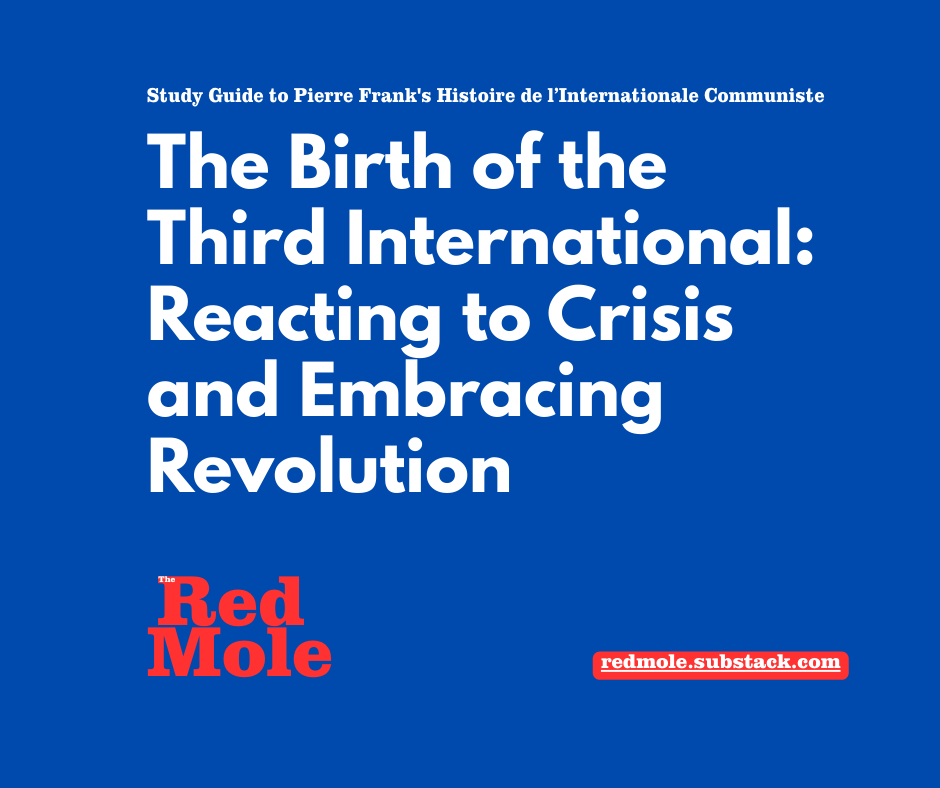The Birth of the Third International: Reacting to Crisis and Embracing Revolution
Introduction: Study Guide to Pierre Frank's "Histoire de l’Internationale Communiste"
[Following on from our recent post about Pierre Frank’s Histoire de l’Internationale Communiste, here is the introduction to a series of ten articles that will act as a study guide to this extensive work, only a small part of which has been translated into English]. A synthetic final article will bring together the major lessons outlined in Frank’s work
The founding of the Communist International in March 1919 was a direct response to the profound crisis of the international workers' movement triggered by the outbreak of the First World War in August 1914. This event is referred to as the "failure of August 1914." The social democratic parties of the Second International, contrary to their pre-war resolutions, largely supported their respective national bourgeoisies and governments in the imperialist conflict. This betrayal of international working-class solidarity demonstrated the bankruptcy of the Second International and the need for a new, truly revolutionary international body.
Figures like Lenin, who had long argued against opportunism within the Second International, immediately recognized the necessity of breaking with the social-chauvinists and building a Third International. As early as April 1917, following his return to Russia, Lenin explicitly called for "Renewing the International. Taking the initiative to create a revolutionary International, an International against the social-chauvinists and against the 'centre'." He further elaborated on this theme, stating, "The Zimmerwald International has gone bankrupt, the Third International must be founded." This perspective faced initial hesitation even within the Bolshevik Party.
The crucial impetus for the actual formation of the Comintern came from the success of the October Revolution in Russia in 1917. The establishment of the world's first workers' state provided a concrete base and an inspiring example for revolutionaries globally. The Soviet government actively pursued internationalist activities, publishing materials in multiple languages for troops on different fronts to encourage fraternization and convening international meetings. This demonstrated a "very vast internationalist activity."
The First Congress of the Communist International was convened in Moscow in March 1919 amidst the revolutionary wave sweeping Europe after the war. It was a relatively small gathering, reflecting the difficult conditions of the time, but it was attended by key figures who would shape the future of the international communist movement. Frank notes that, unlike the First and Second Internationals, the IC was founded under the impulse of the October Revolution and "on a theoretical foundation, that of revolutionary Marxism." Its explicit goal was "to gather national sections whose task was to lead revolutionary struggles worldwide, to overthrow capitalism and establish a socialist society."
A central debate at this founding congress was the contrast between bourgeois democracy and the system of soviets (workers' councils), with the latter being presented as a higher form of democracy for the working class. The congress adopted foundational documents based on revolutionary Marxism, seeing the IC as a "consolidation of the gains of the international proletariat" and, in Rosa Luxemburg's words, "the center of gravity of the proletariat's class organization." Frank, as a militant historian, views the IC as an "outline of the indispensable instrument of the world socialist revolution."
The Congress also took positions on major political developments, such as denouncing the Treaty of Versailles, signed in June 1919, seeing it as a tool of "international gendarmes" – the "English, French and American imperialists" – and exposing the League of Nations as a "league of thieves."
Early on, the Comintern and its key figures like Lenin emphasized the need for revolutionary parties to work within mass organizations, particularly trade unions, and warned against sectarian attitudes. Lenin's Left-Wing Communism: An Infantile Disorder, written before the Second Congress but informed by early experiences like the March Action in Germany, strongly argued against ultra-left tendencies and stressed the importance of winning over the masses. Even in times of acute revolutionary crisis, Lenin maintained a sharp tactical sense regarding mass organizations.
Frank's analysis, which informs this series, is grounded in the study of the IC's own publications, including the minutes of its congresses and executive committee sessions, official periodicals like l'Internationale communiste and la Correspondance internationale, as well as the debates within the Russian Communist Party. Access to these primary sources, now more readily available through efforts like the Comintern Publishing Project, is crucial for a deep understanding of the IC's history. While some historians have presented the IC's interventions as dictates from Moscow, Frank's approach, rooted in the revolutionary Marxist tradition and drawing on sources like Trotsky's analysis, seeks to understand the strategic and theoretical debates that shaped the organization's trajectory.
This first article has laid the groundwork by examining the historical context and founding principles of the Communist International. The subsequent articles will delve into the major strategic debates and historical events that defined the IC's evolution in its early, more revolutionary years, before examining the period of its decline and eventual dissolution.
Bibliography
Frank, Pierre. Histoire de l’Internationale Communiste (1919-1943) Tome 1. 1979.
Frank, Pierre. Histoire de l’Internationale Communiste (1919-1943) Tome 2. 1979.
Le Blanc, Paul. Introduction to On revolutionary strategy: From the early Comintern to Daniel Bensaïd, 2025.
James P. Cannon et al. Excerpts from "Defense Policies and Principles", July 1968.
James P. Cannon. Excerpts from "What policy for Revolutionists", May 1969.
Ernest Mandel. Excerpts from "The Leninist Theory of Organization", undated.
Daniel Bensaïd. Excerpts from "Revolutionary Strategy Today", undated.
Antoine Artous. Excerpts from "Daniel Bensaïd ou la politique comme art stratégique", 2011.




